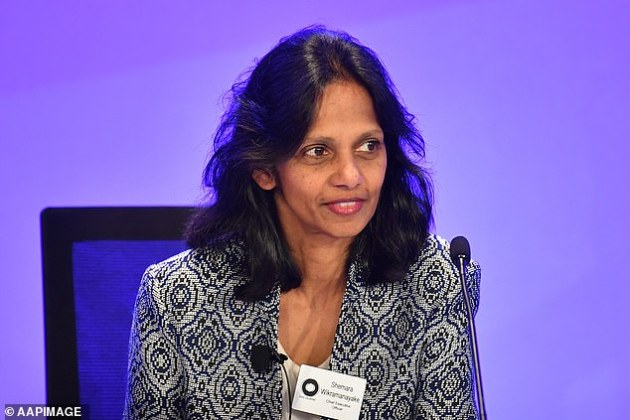A Sri Lankan migrant has become Australia’s highest paid CEO.
The highest paid CEO in Australia and her family immigrated from Sri Lanka with just $200 to their names when she was 14 years old, Daily Mail reported.
Macquarie Group chief executive Shemara Wikramanayake became the first female to take the spot as Australia’s highest paid CEO on Tuesday, taking home $18million during the 2018/19 financial year.
The 57-year-old and her two siblings have all found success since they arrived in the country as teenagers.
Shemara’s older sister Roshana is a top lawyer at the NSW Bar Association while her younger brother is employed as a surgeon in rural NSW.
Her father Ranji previously told the Australian Financial Review the family had enjoyed a life of privilege growing up in Sri Lanka, but that they fell on tough times before finally settling in Australia in 1975.
The Wikramanayake’s came from a long line of highly educated barristers and powerful figures.
Ranji graduated from medical school in 1958 and moved to London with his wife, Amara, for further training in the same year.
The young couple settled down and started a family in England. They had two daughters, Roshana in 1960 and Shemara the following year.
In 1962, when Shemara was just one, the family returned to their home in Ceylon, Sri Lanka, with most of their extended family.
Ranji had been hired as a consultant physician at Colombo General Hospital at just 32 years old. Despite his youth, he was considered one of the top five physicians in the country.
During this period, he developed an interest in researching diabetes – a passion which would one day flourish in Australia.
The couple gave birth to their third child, a boy named Priyan, and shortly after they relocated back to England.
Political unrest and unfounded allegations against Ranji’s father – a successful barrister – forced the family to flee Sri Lanka and return to London.
But the move was costly.
Shemara’s uncle previously told the AFR the entire family once ‘had a very privileged life… we didn’t want for anything,’ but when they arrived in England, they came with very little.
Ranji struggled to find permanent work in the medical industry during his second stint in London.
He filled in for other doctors and commuted to Birmingham for weeks at a time, where he slept in hospital quarters Monday-Friday just to get by.
So in 1975, Ranji made a call on the future of his family. They would move to Sydney, where he was offered a part time job at the Royal Prince Alfred Hospital.
When they arrived, they had their possessions and $200 cash.
‘We lost everything in 1970 and we started life again,’ Ranji previously told AFR. ‘And we started everything again when we moved to Sydney.’
The family rented for six months before scrounging together the money to buy their first home in the harbourside suburb of Rose Bay.
From there, they were able to purchase another home in the exclusive Vaucluse overlooking Sydney Harbour.
Shemara and her sister were enrolled in the exclusive $34,000-a-year Ascham School.
Shemara’s older sister Roshana went on to become a senior policy lawyer at the NSW Bar Association, while her younger brother works at the Southern Highlands Private Hospital in Bowral as a surgeon.
On Tuesday, Shemara was officially named the highest paid CEO in Australia – making history as the first female executive to take the title.
Her $18million salary was $5million more than the next corporate boss, according to OpenDirector’s annual CEO pay report for the Australian Financial Review.
The former corporate lawyer earned a base salary of $722,000 but her remuneration package swelled with performance bonuses and share options.
She earns more than $346,000 a week or more than 211 times an average Australian full-time worker’s $85,000 salary leading the investment bank and financial services group, dubbed the ‘millionaires’ factory’.
The English-born banking veteran last year became Macquarie Group’s first-ever female managing director and CEO.
She had previously worked for the company in nine cities across the globe, and was first hired in 1987.
In 2019, she was also named one of the American Fortune magazine’s ‘Most Powerful Women’ for her work tackling climate change and her other role with the World Bank’s Global Commission on Adaptation.
Ranji said his daughter doesn’t discuss her personal life in the public sphere, as is company policy.
But he did say they are part of ‘an amazing family. We are very private people… Under impossible odds, we have all succeeded.’
(colombo Gazette)

